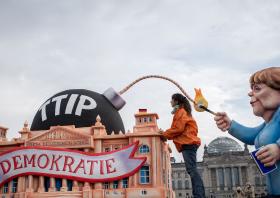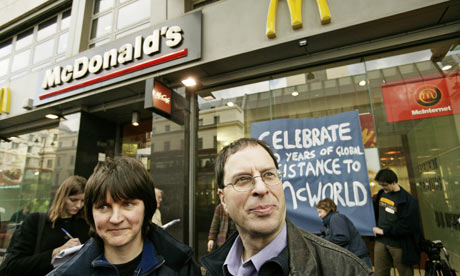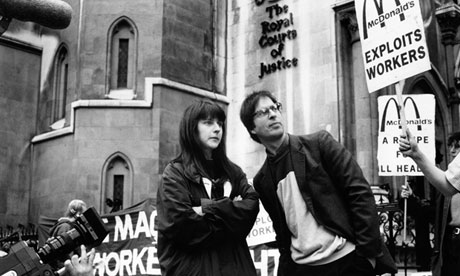Shiv Vishvanathan in The Hindu
The NGO as an expression of voluntarism is a Janus-faced entity and it is this double-edged nature that puts it in a perpetual state of suspicion. The recent Intelligence Bureau report on NGOs against development has to be reread as a part of a new text of suspicion
Jairam Ramesh, the former Union Minister of Environment, once playfully, in fact factiously, commented that the word ‘Intelligence Bureau’ (IB) is an oxymoron. He was warning us that often, instead of collecting information, the IB projects the current fears of the state. It plays out the current politics of anxiety about security and development. What intrigues one is that such suspicion now acquires numeracy. The IB estimates non-governmental organisation (NGO) resistance as negatively impacting GDP by two to three per cent. Seen as a mirror inversion of a Human Development Report, the report becomes surreal. One wonders what the IB will estimate as the price of a dead myth or an extinct waterfall. One is not asking for the source of the estimate or its methodology but the idea itself conveys a false sense of objectivity about the acts of intelligence gathering.
One must also recognise that the NGO as an expression of voluntarism is a Janus-faced entity. At one level, it acts as an extension counter of the state, engaging in acts of humanitarian and social work. At another level, it is a political and cognitive entity challenging development paradigms and arguing issues of governance and democracy. This double-edged nature of the NGO puts it in a perpetual state of suspicion. Yet, we have to recognise that civic epistemologies and civil society creativity are crucial for democracy.
Text of suspicion
The recent IB report has to be reread as a part of a new text of suspicion. It combines issues of environment and defence, internal and external security, and security and sustainability to create a new monster, a threat called “NGOs against development.” The report focusses more on the initiation and delay of projects rather than the suffering caused by these projects through acts of displacement. Development is a benign act of the sovereign state. The NGO and social movements are seen as over-obsessed with acts of suffering. In that sense, it is an upstream rather than a downstream critique of the NGO. The delay becomes the act of sedition and it is these delays that contribute negatively to GDP.
The NGO is then read as a surrogate ploy for the alien or outsider. Behind each NGO is a foreign national or a grant-giving agency. The foreign hand, once legendary in the era of the Cold War, now returns not as CIA but as grant-giving agency. The language of human rights becomes a veneer for a new opposition to the state and serves as a cover for such disruptive activity. In fact, anti-development becomes the label for a network of conspiracies between the local NGO and foreign agencies to keep India in a state of underdevelopment.
Before one responds to the details of the report, one must confess that NGOs are not angelic groups. Many have become institutions which have turned seriatim protest into a career. One creates a trajectory from Bhopal to Narmada to GM foods oblivious of one’s last battles. Many of these groups have advocated transparency and responsibility but failed to apply it to themselves. If the report is a demand for self-reflexivity, one can sympathise with it, but when it clubs NGOs into one bundle and treats them as seditious, it threatens civil society as a space of freedom, dissent and creativity. Once one realises that development has created more refugees than the wars we have fought, one senses that development is more problematic than the IB report can imagine it to be.
‘Anti-development’ label
The report creates anti-development as problematic and especially turns Greenpeace into a monster. One must admit that it is easy to caricature Greenpeace. The organisation’s style is theatric, which often upsets the stuffed-shirt state, used to a sense of dignity. But Greenpeace raises critical issues, confronts the silences of development with a melodramatic, even overstated, eloquence, which is effective and attention-grabbing. It is seen as people-centric rather than government-centric and this focus is regarded as unpardonable. Because it amplifies marginal voices, it is seen as disruptive and yet as a critic said, “If Greenpeace did not exist it would have been invented. It is an early warning system on development and peace issues.” But the real sore point is not the Greenpeace style but the set of issues Greenpeace and other NGOs have raised.
The fourfold resistance of NGOs focusses on nuclear energy, coal-fired plants, genetically modified organisms (GMO) and anti-extractive activities in the northeast. All four are seen as attempts to protect livelihoods, local freedom and obtain fairness. The IB argues that because of this, India has become vulnerable in international forums, unable to voice its usual pieties of peace and development.
The report observes that international agencies earlier used “caste discrimination, human rights and big dams as items to discredit India.” These same forums have graduated to new embarrassments around growth retarding campaigns such as the anti-bauxite, anti-coal, anti-nuclear, anti-GM issues. It is their style and focus that make them so devastating. The IB reads each NGO as a pressure group which creates a specific scenario. It sets an agenda, creates debates in the media, lobbies diplomats and governments generally seeking to create a network of embarrassments. The keywords used are camouflage words, their democratic content hiding a malign intent, a strategy of disruption and delay, restricting development in key sectors. Each NGO is backed by foreign funds, each infiltrates a local group, commandeers a local issue to embarrass and delay the development projects of the regime.
These arguments seem reasonable, the scenario believable till one examines the array of people cited. It is the roll call of the best and brightest in the country. They include S.P. Udayakumar, Suman Sahai, Kavita Kuruganti, Admiral Ramdas, Paranjoy GuhaThakurta, Aruna Rodrigues, Surendra Gadekar. Because they criticise the development project in its specificities, they do not become anti-national. In fact this report should become an early warning system for civil society to gear itself for battles. Whether it is the Congress or the Bharatiya Janata Party (BJP), it is clear that development without jitters is a priority. Dissent becomes an activity frowned upon. In fact, one must recognise there is an NGO in all of us. One must also recognise that the well-being of the nation requires that the demand of the nation not be confused with the imperatives of the nation-state. Nations can allow for diversity, while nation-states seek uniformity and official diktats.
Ethics of intervention, memory
The activists listed link the ethics of invention and the ethics of memory. Tradition and change are linked not through sentimentality but through ideas of livelihood and empowerment. It is not only a rights discourse, it is a battle for survival arguing that the development discourse cannot be indifferent to voice, livelihoods and its roots in community. Riding roughshod over democracy is not a criteria of development. Delay is not the only criteria of evaluation. Time as plurality, history, myth, an ethic of memory, as a guarantee against obsolescence and triage are also relevant criteria. Delay speaks the language of growth without an articulate idea of responsibility and it is on this point that the IB report errs in its witch-hunt against “anti-development”. The politics of delay needs an aetiology, a discourse on causes. Delay is an intermediate stage in the development process. Delay comes because the government fails to talk to people about the location of a project, its implication for livelihoods and life in a locality. When people discover that the black box of national interest has trumped local empowerment they have to resort to politics desperately. What is often dismissed as sedition is mainly a crisis of empowerment, a failure of dialogue. A development that begins with diktats is bound to be delayed. The presence of a foreign hand often becomes a pretext for ignoring local voice and local issues.
The IB report emphasises that these NGOs are a threat to the national, economic security of India. But their understanding of security is restricted. It has no sense of seed security, or forest cover, no sense of trusteeship of the future. What is seen as sedition is often an attempt to combine an ecological sense of sustainability with a classical idea of security. In fact the IB’s sense of security allows for paranoia but not pluralism. A critical response has to deconstruct the categories of its official discourse, the 19th century suspicions that it stirs, and still show that civil society is adding a life-giving content to these categories. Suffering and sensitivity to suffering have to be a part of such measures and these the NGOs manage to do. The other issue the NGOs attempt to raise is the debate around choice of technologies and this the nation-state and its experts resent. A refusal to debate options for the future threatens the future and such stubbornness bordering on illiteracy cannot be conflated with security.
NGO transparency
To create the climate for such a debate, the NGOs have to spring clean their bureaucracies, show that foreign grants do not colour local issues. Second, they have to account for grants and any sub-grants they might make. The trajectory must be transparent to prevent suspicions clouding a crucial debate. Third, they have to demonstrate to the rest of the society that beyond protest, they are seeking to create new epistemologies of knowledge which adds to the quality of livelihood and thus reveal that obsolescence and displacement are not inevitable for the margins. One has to see this report as an anticipation of things to come, a symptom of a society that has become sceptical of some NGO battles. Dissent in these circumstances is going to demand both a heroic inventiveness and a quiet patience.
In reading such a document one has to be careful of labelling it a Modi ploy. It is as much a Manmohan Singh complaint. He was fed up with NGOs opposing nuclear energy. The politics of regimes might be different but their paranoias are the same — security being threatened by local groups. Both would love a discourse which subsumes sustainability under security. Moreover, suspicion and paranoia need a scapegoat. The funder abroad as invisible hand, the Greenpeace as the more visible hand become easy candidates. One cannot deny that foreign groups might help stir the political pot. Their behaviour often warrants suspicion. The challenge before these NGOs is to create a public space where three things are clear. First, they have to create systems of audit which are both rule bound, time bound and transparent. Foreign funds are not cornucopia to be showered on all and sundry like confetti. Second, one has to communicate the vitality and the life-giving nature of the issues. It cannot be left to the experts and the bureaucrats of the state. Third, one needs an ethic of responsibility which includes professionalism as ascetic lifestyle, a precision of articulation which carries greater conviction. The battle of competing rhetoric will not do. It is a challenge to create a public space around the silences of the state and include the margins of the nation. One needs a space which allows for dissent and debate, which is both cathartic and constructive and which incorporates the future as a constituency. It is not defensiveness that we need but a confidence to experiment, to debate, to create alternatives, The state could be afraid of the foreign hand but what states often found even more alien is the process of empowerment, the attempt to create a different democracy.
The IB report is right in emphasising the critical nature of the four issues. But what is equally critical is the synergy of democracy that NGOs need to create around these issues. Each struggle has to be a fable for the future. To do less would make the report more real and true over time. Civil society has to make sure that this IB report does not become a self-fulfilling prophecy.




